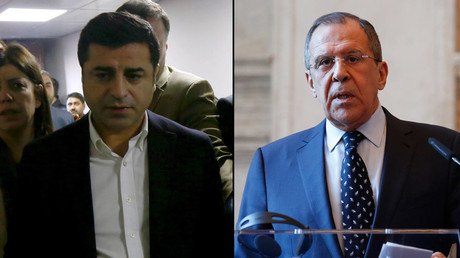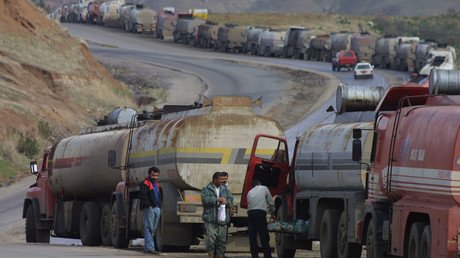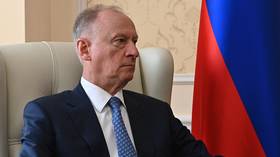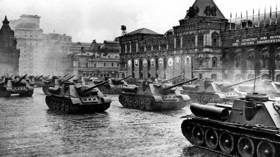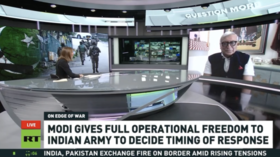Turkey dishes out garbage on Russia's work in Syria
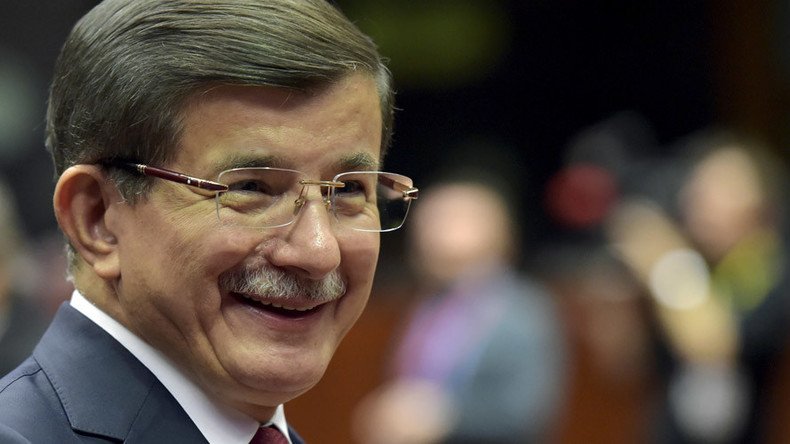
The Most Hypocritical Statement of 2015 awards have lots of strong contenders - but Turkish Prime Minister Ahmet Davutoglu has made a dramatic late grasp for glory.
He has condemned an attack on Idlib in north-west Syria believed to have been carried out by Russian planes, saying Syrian lands will not be part of "Russian imperialist goals."
That’s right - the Prime Minister of Turkey - a country which has spent the past four years trying to get its favored ‘rebels’ into power in Syria - and which has sent its own troops into northern Iraq - is criticizing somebody else for having ’imperialist goals’!
Davutoglu’s statement is a classic example of what psychologists call ‘projection’ - accusing others of things that you yourself are guilty of.
Neocons, who ignore the hundreds of thousands of deaths they caused in Iraq following the illegal invasion of 2003, do it all the time when they label people they don’t like ‘war crime deniers’.
Or when they call people ‘conspiracy theorists’ - when it was they who peddled the biggest conspiracy theory of the 21st century - namely that Iraq had WMDs.
Now it seems the practice is all the rage in governing circles in Ankara too.
Imperialist goals are most certainly are being pursued in Syria, but not by Russia- which is only intervening in Syria with the permission of that country’s lawful and UN-recognised government.
While the dominant western narrative portrays the conflict as the fault of a Syrian ‘regime’ which tried to brutally suppress an ‘Arab spring’ uprising, US regime change plans for Syria go back to at least 2006, according to wikileaks.
The Arab Spring- as I argued here - was merely the smokescreen to go full steam ahead with already formulated plans for ‘regime change’ by Syria’s enemies who resented its independence and its friendship with Iran.
As the award-winning investigative journalist John Pilger put it, the ‘true crime’ of the Syrian Arab Republic was "not the oppressive nature of its government but its independence from American and Israeli power – just as Iran’s true crime is its independence, and Russia’s true crime is its independence … In an American-owned world, independence is intolerable.”
Independent Syria was targeted by the US and its allies, in the same way that Yugoslavia, Afghanistan, Iraq and Libya were targeted. The model used by imperalists in Syria most closely resembles the strategy deployed in Yugoslavia and Libya. Demonization of the ‘regime’ and its leader and support to ’rebels’ portrayed as ‘moderates'.Followed up by air strikes from NATO to help the western approved ‘rebels’ come to power.
But in Syria, stage three proved a problem. The British Parliament voted against air strikes on the Syrian government in 2013. And by 2015, it was clear - even to those who generally were in favor of the imperial strategy - that the ‘moderate rebels’ weren’t very ‘moderate’ at all.
Even the think-thank of former British Prime Minister Tony Blair now concedes that most of the ‘moderate’ rebels in Syria sympathize with ISIS.
If Russian policy towards Syria can be criticized it is that the intervention which we saw in September this year did not come earlier. But when it did come, it became a game changer - or even a game ender.
The ‘regime changers’ are now badly rattled.
It’s hard to believe it now, but only six years ago, Turkey was being called"Syria’s new best friend." But Recep Tayyip Erdogan foolishly abandoned a wise policy ‘good neighbours,' threw his lot in with the US and Qatar and gambled heavily on the Assad government falling in Damascus.
Now it's clear that the ’rebel’ horses he backed in the Syrian Regime Change Handicap aren’t going to cross the finishing line in a race that has proved to be a marathon, not a sprint.
Now some gamblers take their reverses with a smile and a shrug, others lash out in all directions, blaming the jockeys, the ground, the trainers, anything they can. Erdogan and the ruling Turkish elite sadly fit into the latter category. We saw this pique with the shooting down of a Russian jet in November - an act of aggression which has cost Turkey a high economic price with Moscow retaliating with sanctions.
And we see it too with the rhetoric currently coming out from Ankara.
While others welcomed last week’s UN resolution on Syria, Turkey
was not so pleased. "Such resolutions have never helped solving or sorting out the Syrian problems and Assad is still there," was Ahmet Davutoglu’s response. "The longer Assad is there, there will be more chaos ... all countries must know Assad is not serving their interests," he continued.
Back in November, Davutoglu told CNN’s Christine Amanpour "If Assad stays in power in Damascus, I don't think any refugee will go back…The question is not how and how long Assad will stay, the question is when and how Assad will go."
Got the message?
Yes, Mr Davutoglu - the man who condemns others for having ‘imperialist goals’ in Syria - is obsessed with the removal from power of the leader of a neighbouring state. At the same time, Ankara has failed to adequately address the mounting evidence of Turkish links to ISIS.
Turkey has claimed its interest in Syria is to promote democracy in the country, but in fact its regime change-at any-cost-policies have only brought death and destruction to the Syrian people. Over the past few years the one-time 'good neighbour' of Syria has morphed into the neighbour from Hell- one that nobody would want to live next door to.
Writing in Zero Hedge, ‘Tyler Durden’ argues that there is now a division between the hardline Turkish (and Saudi and Qatari) position, which supports Sunni extremists in Syria and is still calling for Assad to go and the position of Britain, France and Germany- which is now just a little bit less vehemently anti-Assad and is now more critical of jihadists in the country.
The US, Durden argues, is undecided which camp to fall into.
The thesis could be correct, but it could also be that Turkey has been assigned the role of ‘bad cop’, to the European powers ‘better cop’.
For obvious reasons western countries, post-Paris, now have to be seen to be taken a harder line on jihadists in Syria - and need to be seen - at least publicly to be softening their line on Assad in the interests of bringing about a ‘peace settlement’.
In any case, Russia’s intervention has meant the need for a change in strategy. But Turkey can be used as the country to keep the pressure on and to pursue the West’s anti-Russian objectives.
The attack on Russia for pursuing ‘imperialist goals’ in Syria may yet win the Turkish Prime Minister the Most Hypocritical Statement of Year award for 2015. The question is: Just who is Mr Davutoglu’s scriptwriter?
The statements, views and opinions expressed in this column are solely those of the author and do not necessarily represent those of RT.

